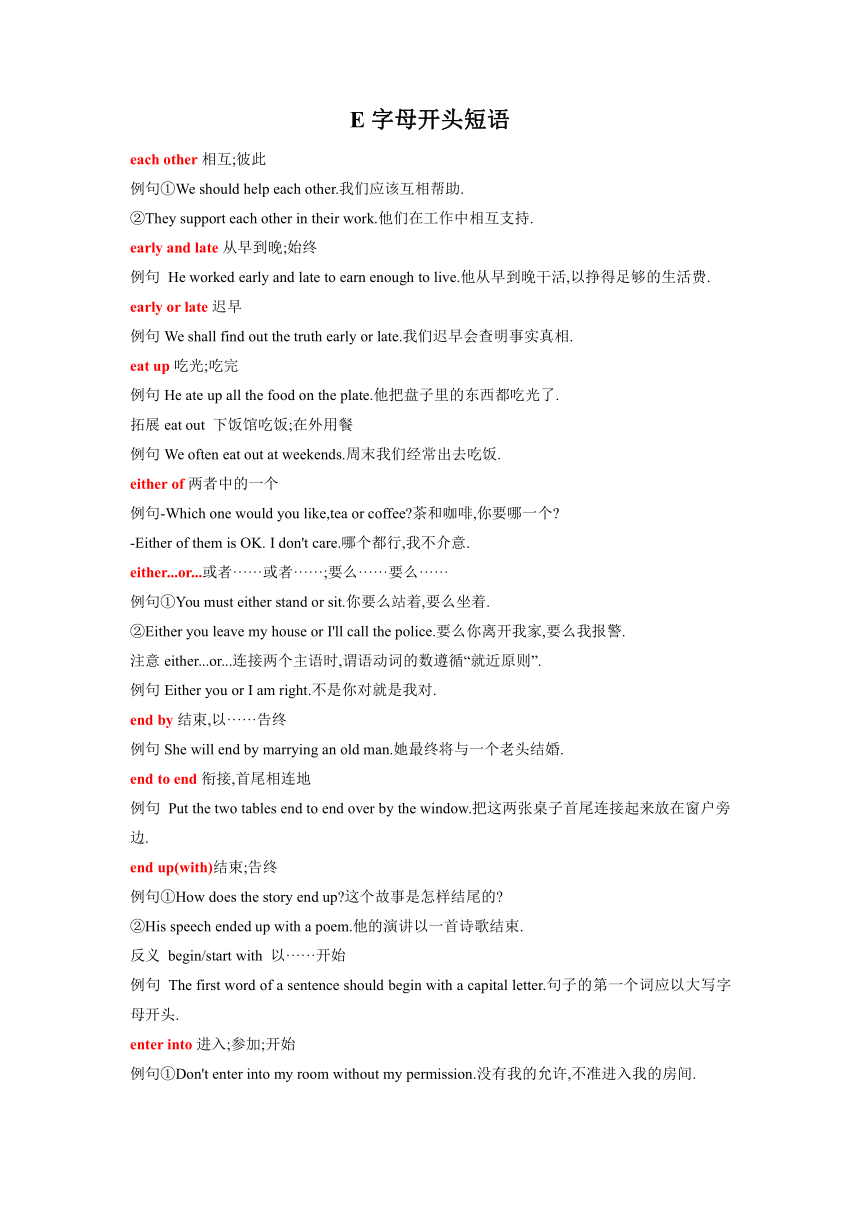中考英语必记短语E字母开头
图片预览

文档简介
E字母开头短语
each other相互;彼此
例句①We should help each other.我们应该互相帮助.
②They support each other in their work.他们在工作中相互支持.
early and late从早到晚;始终
例句 He worked early and late to earn enough to live.他从早到晚干活,以挣得足够的生活费.
early or late迟早
例句We shall find out the truth early or late.我们迟早会查明事实真相.
eat up吃光;吃完
例句He ate up all the food on the plate.他把盘子里的东西都吃光了.
拓展eat out 下饭馆吃饭;在外用餐
例句We often eat out at weekends.周末我们经常出去吃饭.
either of两者中的一个
例句-Which one would you like,tea or coffee 茶和咖啡,你要哪一个
-Either of them is OK. I don't care.哪个都行,我不介意.
either...or...或者······或者······;要么······要么······
例句①You must either stand or sit.你要么站着,要么坐着.
②Either you leave my house or I'll call the police.要么你离开我家,要么我报警.
注意either...or...连接两个主语时,谓语动词的数遵循“就近原则”.
例句Either you or I am right.不是你对就是我对.
end by结束,以······告终
例句She will end by marrying an old man.她最终将与一个老头结婚.
end to end衔接,首尾相连地
例句 Put the two tables end to end over by the window.把这两张桌子首尾连接起来放在窗户旁边.
end up(with)结束;告终
例句①How does the story end up 这个故事是怎样结尾的
②His speech ended up with a poem.他的演讲以一首诗歌结束.
反义 begin/start with 以······开始
例句 The first word of a sentence should begin with a capital letter.句子的第一个词应以大写字母开头.
enter into进入;参加;开始
例句①Don't enter into my room without my permission.没有我的允许,不准进入我的房间.
②He entered into business at the age of 25.他25岁就进入了商界.
enjoy oneself过得愉快
例句They enjoyed themselves at the party last night.他们昨晚在聚会上玩得很愉快.
同义have a good time 过得愉快
例句We hope you will have a good time in Beijing.我们希望你们在北京玩得愉快.
escape from从······逃跑
例句I heard that three monkeys escaped from the zoo.我听说三只猴子从动物园逃走了.
even if/though即使;纵然
例句①We shall go,even if it rains.就是下雨,我们也要去.
②Even if he had the money,he wouldn't buy it.他即便有钱也不会买它.
注意even if/though 不能与but连用,但可以与still和yet连用.
ever since从那时到现在
例句I have not seen him ever since.从那以后我没见到过他.
every day每天
例句Our classroom should be cleaned every day.我们的教室应天天打扫.
拓展everyday 每日的,日常的
例句He keeps on learning some everyday English every day.他每天坚持学一些日常英语.
every other (=every two+[C]s)
例句They visited us every other week.他们每隔一周看望我们一次.
except for除了;若不是
例句 His composition is good except for some spelling mistakes.他的作文写得很好,除了几个拼写错误以外.
拓展except除去,不包括(强调所排除的“不包括在内”,一般表示同类之间的关系)
例句You can have any of the cakes except this one.除了这块蛋糕,你吃哪块都行.
excuse me对不起;打扰
例句Excuse me,is this your phone 打扰了,这是你的手机吗
拓展sorry 用于说错话或做错事,或无意中给别人制造麻烦而心存歉意的场合.
eye exercises眼保健操
例句Doing eye exercises is good for your eyes.做眼保健操对你的眼睛有益.
each other相互;彼此
例句①We should help each other.我们应该互相帮助.
②They support each other in their work.他们在工作中相互支持.
early and late从早到晚;始终
例句 He worked early and late to earn enough to live.他从早到晚干活,以挣得足够的生活费.
early or late迟早
例句We shall find out the truth early or late.我们迟早会查明事实真相.
eat up吃光;吃完
例句He ate up all the food on the plate.他把盘子里的东西都吃光了.
拓展eat out 下饭馆吃饭;在外用餐
例句We often eat out at weekends.周末我们经常出去吃饭.
either of两者中的一个
例句-Which one would you like,tea or coffee 茶和咖啡,你要哪一个
-Either of them is OK. I don't care.哪个都行,我不介意.
either...or...或者······或者······;要么······要么······
例句①You must either stand or sit.你要么站着,要么坐着.
②Either you leave my house or I'll call the police.要么你离开我家,要么我报警.
注意either...or...连接两个主语时,谓语动词的数遵循“就近原则”.
例句Either you or I am right.不是你对就是我对.
end by结束,以······告终
例句She will end by marrying an old man.她最终将与一个老头结婚.
end to end衔接,首尾相连地
例句 Put the two tables end to end over by the window.把这两张桌子首尾连接起来放在窗户旁边.
end up(with)结束;告终
例句①How does the story end up 这个故事是怎样结尾的
②His speech ended up with a poem.他的演讲以一首诗歌结束.
反义 begin/start with 以······开始
例句 The first word of a sentence should begin with a capital letter.句子的第一个词应以大写字母开头.
enter into进入;参加;开始
例句①Don't enter into my room without my permission.没有我的允许,不准进入我的房间.
②He entered into business at the age of 25.他25岁就进入了商界.
enjoy oneself过得愉快
例句They enjoyed themselves at the party last night.他们昨晚在聚会上玩得很愉快.
同义have a good time 过得愉快
例句We hope you will have a good time in Beijing.我们希望你们在北京玩得愉快.
escape from从······逃跑
例句I heard that three monkeys escaped from the zoo.我听说三只猴子从动物园逃走了.
even if/though即使;纵然
例句①We shall go,even if it rains.就是下雨,我们也要去.
②Even if he had the money,he wouldn't buy it.他即便有钱也不会买它.
注意even if/though 不能与but连用,但可以与still和yet连用.
ever since从那时到现在
例句I have not seen him ever since.从那以后我没见到过他.
every day每天
例句Our classroom should be cleaned every day.我们的教室应天天打扫.
拓展everyday 每日的,日常的
例句He keeps on learning some everyday English every day.他每天坚持学一些日常英语.
every other (=every two+[C]s)
例句They visited us every other week.他们每隔一周看望我们一次.
except for除了;若不是
例句 His composition is good except for some spelling mistakes.他的作文写得很好,除了几个拼写错误以外.
拓展except除去,不包括(强调所排除的“不包括在内”,一般表示同类之间的关系)
例句You can have any of the cakes except this one.除了这块蛋糕,你吃哪块都行.
excuse me对不起;打扰
例句Excuse me,is this your phone 打扰了,这是你的手机吗
拓展sorry 用于说错话或做错事,或无意中给别人制造麻烦而心存歉意的场合.
eye exercises眼保健操
例句Doing eye exercises is good for your eyes.做眼保健操对你的眼睛有益.
